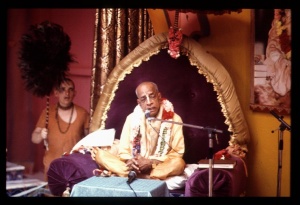SB 6.16.5: Difference between revisions
m (1 revision(s)) |
No edit summary |
||
| Line 1: | Line 1: | ||
{{info | {{info | ||
|speaker= | |speaker=dead son of King Citraketu | ||
|listener=King Citraketu | |listener=Nārada Muni and assembly of King Citraketu | ||
}} | }} | ||
[[Category:Srimad-Bhagavatam - Canto 06 Chapter 16|s05 ]] | |||
[[Category:Bhagavatam Verses Spoken by the Dead Son of Citraketu Maharaja - Vanisource|061605]] | |||
<div style="float:left">'''[[Srimad-Bhagavatam]] - [[SB 6|Sixth Canto]] - [[SB 6.16: King Citraketu Meets the Supreme Lord|Chapter 16: King Citraketu Meets the Supreme Lord]]'''</div> | |||
<div style="float:right">[[File:Go-previous.png|link=SB 6.16.4]] '''[[SB 6.16.4]] - [[SB 6.16.6]]''' [[File:Go-next.png|link=SB 6.16.6]]</div> | |||
{{RandomImage}} | |||
==== TEXT 5 ==== | ==== TEXT 5 ==== | ||
<div class="verse"> | |||
<div | :bandhu-jñāty-ari-madhyastha- | ||
bandhu-jñāty-ari-madhyastha- | :mitrodāsīna-vidviṣaḥ | ||
mitrodāsīna-vidviṣaḥ | :sarva eva hi sarveṣāṁ | ||
sarva eva hi sarveṣāṁ | :bhavanti kramaśo mithaḥ | ||
bhavanti kramaśo mithaḥ | |||
</div> | </div> | ||
| Line 17: | Line 22: | ||
==== SYNONYMS ==== | ==== SYNONYMS ==== | ||
<div class="synonyms"> | |||
<div | ''bandhu''—friends; ''jñāti''—family members; ''ari''—enemies; ''madhyastha''—neutrals; ''mitra''—well-wishers; ''udāsīna''—indifferent; ''vidviṣaḥ''—or envious persons; ''sarve''—all; ''eva''—indeed; ''hi''—certainly; ''sarveṣām''—of all; ''bhavanti''—become; ''kramaśaḥ''—gradually; ''mithaḥ''—of one another. | ||
</div> | </div> | ||
| Line 25: | Line 29: | ||
==== TRANSLATION ==== | ==== TRANSLATION ==== | ||
<div class="translation"> | |||
<div | |||
In this material world, which advances like a river that carries away the living entity, all people become friends, relatives and enemies in due course of time. They also act neutrally, they mediate, they despise one another, and they act in many other relationships. Nonetheless, despite these various transactions, no one is permanently related. | In this material world, which advances like a river that carries away the living entity, all people become friends, relatives and enemies in due course of time. They also act neutrally, they mediate, they despise one another, and they act in many other relationships. Nonetheless, despite these various transactions, no one is permanently related. | ||
</div> | </div> | ||
| Line 32: | Line 35: | ||
==== PURPORT ==== | ==== PURPORT ==== | ||
<div class="purport"> | |||
It is our practical experience in this material world that the same person who is one's friend today becomes one's enemy tomorrow. Our relationships as friends or enemies, family men or outsiders, are actually the results of our different dealings. Citraketu Mahārāja was lamenting for his son, who was now dead, but he could have considered the situation otherwise. "This living entity," he could have thought, "was my enemy in my last life, and now, having appeared as my son, he is prematurely leaving just to give me pain and agony." Why should he not consider his dead son his former enemy and instead of lamenting be jubilant because of an enemy's death? As stated in [[Bhagavad-gita As It Is (1972)|''Bhagavad-gītā'']] ([[BG 3.27 (1972)|BG 3.27]]), ''prakṛteḥ kriyamāṇāni guṇaiḥ karmāṇi sarvaśaḥ:'' factually everything is happening because of our association with the modes of material nature. Therefore one who is my friend today in association with the mode of goodness may be my enemy tomorrow in association with the modes of passion and ignorance. As the modes of material nature work, in illusion we accept others as friends, enemies, sons or fathers in terms of the reactions of different dealings under different conditions. | |||
</div> | |||
<div | <div style="float:right; clear:both;">[[File:Go-previous.png|link=SB 6.16.4]] '''[[SB 6.16.4]] - [[SB 6.16.6]]''' [[File:Go-next.png|link=SB 6.16.6]]</div> | ||
__NOTOC__ | |||
</div> | __NOEDITSECTION__ | ||
__NOTOC__ | |||
Revision as of 04:43, 14 May 2021

A.C. Bhaktivedanta Swami Prabhupada
TEXT 5
- bandhu-jñāty-ari-madhyastha-
- mitrodāsīna-vidviṣaḥ
- sarva eva hi sarveṣāṁ
- bhavanti kramaśo mithaḥ
SYNONYMS
bandhu—friends; jñāti—family members; ari—enemies; madhyastha—neutrals; mitra—well-wishers; udāsīna—indifferent; vidviṣaḥ—or envious persons; sarve—all; eva—indeed; hi—certainly; sarveṣām—of all; bhavanti—become; kramaśaḥ—gradually; mithaḥ—of one another.
TRANSLATION
In this material world, which advances like a river that carries away the living entity, all people become friends, relatives and enemies in due course of time. They also act neutrally, they mediate, they despise one another, and they act in many other relationships. Nonetheless, despite these various transactions, no one is permanently related.
PURPORT
It is our practical experience in this material world that the same person who is one's friend today becomes one's enemy tomorrow. Our relationships as friends or enemies, family men or outsiders, are actually the results of our different dealings. Citraketu Mahārāja was lamenting for his son, who was now dead, but he could have considered the situation otherwise. "This living entity," he could have thought, "was my enemy in my last life, and now, having appeared as my son, he is prematurely leaving just to give me pain and agony." Why should he not consider his dead son his former enemy and instead of lamenting be jubilant because of an enemy's death? As stated in Bhagavad-gītā (BG 3.27), prakṛteḥ kriyamāṇāni guṇaiḥ karmāṇi sarvaśaḥ: factually everything is happening because of our association with the modes of material nature. Therefore one who is my friend today in association with the mode of goodness may be my enemy tomorrow in association with the modes of passion and ignorance. As the modes of material nature work, in illusion we accept others as friends, enemies, sons or fathers in terms of the reactions of different dealings under different conditions.